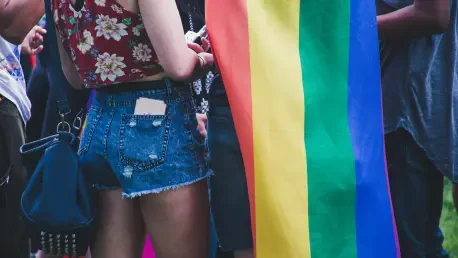In an unfolding conflict with significant political and cultural ramifications, cities like Salt Lake City, Utah, and Boise, Idaho, are challenging state-imposed bans on certain flag displays at government properties. Their bold actions emphasize inclusivity by adopting official city flags supporting LGBTQ+ communities. This clash between local city administrations advocating progressive values and Republican-controlled state legislatures promoting conservative mandates is intensifying, symbolizing a larger struggle for representation and autonomy in civic spaces.
Unveiling Inclusivity Through City Council Actions
Recently, Salt Lake City’s council adopted new flags honoring LGBTQ+ pride and Juneteenth. This decision was taken to align with city code while countering state legislation defining which flags can be exhibited. Boise’s Mayor Lauren McLean, similarly, ensured the pride flag remained at City Hall, going so far as to declare it an official city flag alongside another for organ donors. These council approvals highlight a concerted stance to maintain an inclusive atmosphere despite restrictive state measures, underscoring the cultural shift municipalities are determined to support.
Leaders’ Voices: Insights and Motivations
City leaders in Salt Lake City and Boise have articulated their dedication to diverse representation through strategic public statements and council meetings. They have underscored a commitment to inclusivity and have openly addressed the legal strategies employed to circumvent state bans. Republican lawmakers, however, have questioned the legality of these maneuvers, suggesting legislative or judicial repercussions. As authorities like Utah’s State Auditor’s Office work to enforce flag bans, potential conflict looms, risking financial penalties for the cities involved.
Engaging the Community: Workshops and Panels
In response to these city decisions, community workshops and engagements have sprung up, enhancing public involvement. These activities have provided a platform for discussion, facilitating understanding and support for the councils’ inclusive agenda. Panels comprising local politicians, community figures, and advocacy groups have sparked debates that reflect both consensus and tension, bringing diverse community perspectives on expressiveness and representation in local governance to the fore.
Innovating Resistance: Local Symbolic Acts
Communities like Bonners Ferry, Idaho, have demonstrated innovative methods of resistance to state-imposed restrictions. By designating every day as a “special occasion” for flag displays, they have maintained the tradition of flying international flags as symbols of friendship and resistance. These acts reflect a creative and determined pushback against restrictive laws, emphasizing local resilience and inspiring other cities.
Long-term Implications for Local Governance
The events unfolding in Salt Lake City and Boise portend significant implications for the future of local governance and community representation. These actions and the resulting backlash highlight a growing rift and tension over inclusivity, with city leaders standing firm in their resolve to advocate for diverse community interests. Moving forward, this situation may inspire other cities to adopt similar strategies, shaping the broader movement toward inclusivity and impacting legislative trends and socio-political landscapes.









